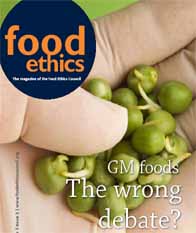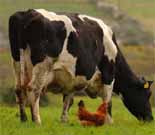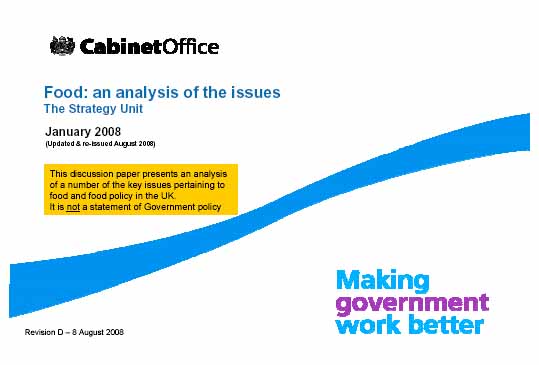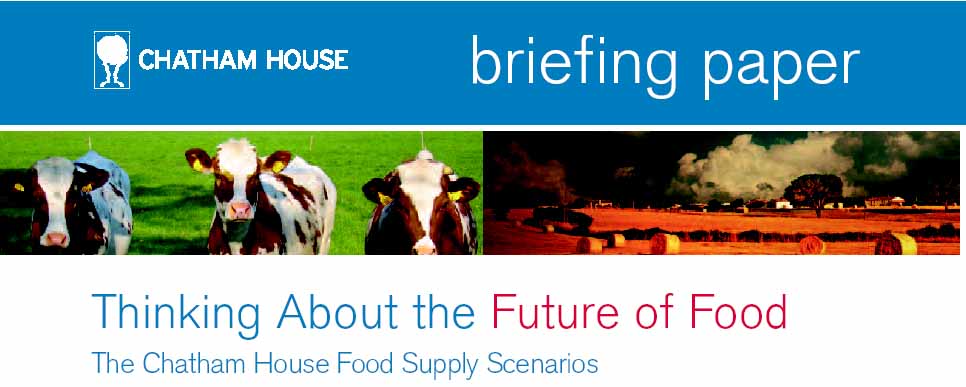|
December Committee on Climate Change Building a Low Carbon economy Chap 9 (pdf) notes "that agriculture is a sector where there is no existing policy framework to deliver emissions reductions. We therefore plan to deepen our analysis of agriculture in subsequent reports and recommend that the Government should focus on developing a policy framework for this sector." DEFRA and the rest UK Strategy for Sustainable Fruit n Vegetable is "to ensure that aid for Producer Organisations is used most effectively in ways which support the sustainable long term development of the fruit and vegetables industry". Food Ethics Council Business Forum on Protecting Workers (pdf) discussed "what factors drove worker exploitation in agriculture horticulture and primary processing. What responsibiliities do businesses further down the supply chain, as well as consumers and governments, have for improving conditions in the sector?" Fabian Society Lecture by Hilary Benn Bread & Roses: Politics of Food said "Food is politics at its most raw" and then went on to say "Domestic food production is hugely important – we rely on it – but we cannot and should not look just to the UK for all the food we need. Rather, we should look to maintain the security of our sources of supply." November Western Morning News in £1.3 Billion on Food Imports shows that while the total amount of fruit and vegetables, potatoes, wheat and barley has soared by almost a fifth since 1997, the bill has rocketed by twice that rate. Pete Ritchie of Whitmuir Organics in Recapitalising the UK Food System says: "Our food system erodes more than natural capital. It draws heavily on human capital, sponging off low-paid, low status workers in food and farming....and trades in complex derivatives - processed food which deskills and infantilises us to the point where we lack the basic skills of growing, sourcing and preparing food and have to buy them back from celebrity chefs." International Journal of Retail & Distribution Management Moving towards sustainable food retailing? reflects on the review entitled Green, Healthy and Fair published by the Sustainable Development Commission in February. New Economics Foundation Nine Meals from Anarchy: Oil dependence, climate change and the transition to resilience (pdf) spells out why we need a New Green Deal.
Europe's World How Europe should tackle the Global Food Crisis outlines how President Sarkozy has proposed a global partnership for food with three pillars - an international group made up of all interested parties to draft a worldwide strategy for food security, an international scientific platform evaluating the world’s agricultural situation, and the international finance community that deals with agriculture and rural development should be further mobilised. October Royal Agricultural Soceity of England (RASE) report Dwindling Science base poses threat to UK Soil health says "The UK's soil and water research base has diminished catastrophically from its peak and is now failing to provide the required support for the nation‟s farmers and land managers. There is little connection with production agriculture and apparently no coordinated vision for applied research. GRAIN Seized: The 2008 landgrab for food and financial security says "Today’s food and financial crises have, in tandem, triggered a new global land grab. On the one hand, “food insecure” governments that rely on imports to feed their people are snatching up vast areas of farmland abroad for their own offshore food production. On the other hand, food corporations and private investors, hungry for profits in the midst of the deepening financial crisis, see investment in foreign farmland as an important new source of revenue". James Martin Institute Symposium Can Britain Feed Itself, Should Britain Feed Itself? recommended that this report "feed into the government process of identifying regulatory measures for a better long term sustainable stable food system".
September UNEP, ILO & ITUC Green Jobs: Chap 5 Food & Agriculture says "the search for green employment opportunities in agriculture is faced with several formidable obstacles....while the interest in sustainable agriculture has grown in recent years, employment is not always a central theme or consideration." We get a mention on p226 ref 823 which says:"Sustainable Food Guide (UK-based NGO working with unions, farmers and public officials) www.sustainablefood.com/guide/milesissue.html.". Thank you UN! New Scientist article Dinner's dirty secret calculates (using low-carbon-diet calculator) that "household greenhouse gas emissions from food account for almost twice those produced by driving (in the US). Most of this comes from the food production process itself, rather than food-miles, as is often believed".
Cadbury's Mapping Sustainable Production in Ghanaian Cocoa says that it requires "ongoing investment and support to secure its long-term sustainability and to improve the livelihoods of its cocoa farmers." National Consumer Council report Cut price, what cost? rates the UK’s top eight supermarkets on "how they help their customers shop, cook and eat more healthily". It makes Sainsbury's top, Co-op just behind, Tesco 5th & Morrison's bottom. August Charlie Clutterbuck, our Director, published an article in Outlooks for Pest Management Aug 08 called "Environment, Social and Economic aspects of Sustainable Food Supply, with special reference to pest management" about "How do pesticides fit in with the wider debate about “more sustainable” agriculture? Pesticide use over the next few years may change in ways that reflect emerging debates about agriculture, science and sustainability." pdf of article National Horticultural Forum Review of the provision of UK Horticultural R&D (pdf) spells out: "The deficit of funding for strategic/applied R&D underpinning production horticulture is growing". One of their recommendations is for the Horticultural Development Company to address "a skills deficit in horticultural R&D by supporting shortcourse training in aspects of practical horticulture" - despite HDC not now having the leverage of DEFRA money. BBC Green Room Feeling the heat of Food Security. "Reforming the economics of food production and supply would be beneficial for a number of environmental and social problems, argues Peter Baker. A key issue, he says, is understanding the energy involved in putting food on your plate." Director General of FAO warns of 'Neo-Colonialism' due to "the race by food-importing countries to secure farmland overseas to improve their food security risks". November '08, Bilateral Land Deal between Daewoo of S Korea and Madagascar's government, who has leased them an area of farmland about half the size of Belgium for 99 years. (Since then, there has been a change in governance in Madagascar, partly as a result of this Daewoo deal, which has now been ditched Reuters Story) World Bank From Agriculture to Nutrition (pdf) says: "The relationship between agriculture and human nutrition is far more complex than the relationship between food production and food consumption or the economic relationship between food supply and food demand. Increased food production raises the availability of food, but by itself does little to ensure that poor and vulnerable people have access to the food that is produced. Nor does the gross quantity produced say much about the quality or nutritional value of people’s diets".
July ActionAid Right to Food (pdf) examines the devastating impacts of 'food surges' on developing countries. Food imports into developing countries have risen rapidly since the 1990's, wiping out certain domestic farm / food sectors in importing countries. FDF's Checklist for Greener Food Transport, Transport Efficiency, making the real difference (pdf), helps food companies to include in their contracts with hauliers ways to achieve 'fewer and friendlier' food transport miles. Carolyn Steel's Hungry City: How food shapes our lives shows how our concrete jungles reflect how we produce and consume food. She says that the real message of Hungry City is "that food is not just a question of what we eat, but something that shapes every aspect of our world. By recognising its importance, we can change a lot of things for the better." Listen to Food Programme for more, espcially on Sitopia - from the Greek sitos, meaning food, and topos, place. Dept of Health's newsletter Healthier Weight, Healthier Lives: Six months on outlines progress towards aim to reduce the proportion of overweight and obese children to 2000 levels and "what this means for schools, the food industry, employers, health services and others", DEFRA's paper Ensuring the UK's Food Security in a changing world describes "the trends that have led to the current global situation, setting out the challenges that will continue to impact the food chain", and discusses "whether the UK food supply chain is sufficiently resilient" to shocks and challenges. Go to their discussion and ask: what sort of food system do you want and what do you want the UK govt to do to deliver it sustainably?
RELU Land to Mouth Briefing Paper "exploring the links between sustainable land use and the food we eat." June Bidwells Bull Run in Soft Commodities asks: Is it a commodity cycle or structural shift in food and farming? This is pretty crucial because: "large rises in soft commodity prices will ultimately fuel inflation (so called ‘agflation’) on a global scale. This could unsettle the economic stability, which underpins the very economic growth that creates the demand in the first instance." Parliamentary debate (June 3) on Food Security where the Minister says: "We want a flexible, skilled and market-oriented domestic agricultural sector that makes a positive contribution to our environment". May Ernst & Young "Food for Thought spells out that "The UK is more exposed to rising world food prices than its peers – it runs a trade deficit in food equal to 1% of GDP, whereas the US is in balance and France runs a surplus. The UK’s deficit in food, beverages and tobacco has deteriorated by 14% over the last year...(which) will add to the deterioration in the terms of trade, thereby dragging down growth."
FAO says food prices will remain high despite higher output. Assistant Director-General Hafez Ghanem says. “We are facing the risk that the number of hungry will increase by many more millions of people.” Wall Street Journal Grain, Seed & Chemical companies profits soar. "At a time when parts of the world are facing food riots, Big Agriculture is dealing with a different sort of challenge: huge profits....Companies that work most directly with farmers are gaining the most from higher food and grain prices, while companies further along in the food chain are smarting....Food Companie say bigger profits can be used to develop new technologies that will ultimately help farmers improve productivity". WRAP's "The Food We Waste" report worked out that UK households now throw away £10 billion worth of food per year - equalling 6.7 m tonnes. This equates to about £600 per family/yr or 4.4 m apples, 1.3 m bananas and 1/2 mill chickens per day. EU Citizens in Commission Poll say that the priorities for CAP should be to provide healthy and safe food, ensure a fair standard of living for farmers & promote respect of the environment, and more... April Global Environmental Change and Food Systems (GECAFS) Conference on "Food Security and Environmental Change: Linking Science, Development and Policy for Adaptation" (Oxford, April 2008) Presentations covered a vast range of subjects - food and GHG emissions, biofuels, water stress, crop adaptation, food security and urbanisation, household adaptation to food stress…. Mark Lynas in New Statesman explains "How the rich starved the world". "American cars now burn enough corn to cover all the import needs of the 82 nations classed by the UN's Food and Agriculture Organisation (FAO) as "low-income food-deficit countries". The UN International Assessment of Agricultural Science and Technology for Development (IAASTD) Report asks: ""How can we reduce hunger and poverty, improve rural livelihoods, and facilitate equitable, environmentally, socially and economically sustainable development through the generation, access to, and use of agricultural knowledge, science and technology?" IAASTD Publicity Materials, Synthesis Report March
PASA "Sustainable Food" spells out that "when making a purchasing decision, we must take into account the environmental impacts associated with what we grow, how we transport it and how we dispose of it" Reuters Feature says "the world is facing a food crisis and in some places it is already boiling over." Syngenta Corporate Social Responsibility Report spells out its commitment "to sustainable agriculture through innovative research and technology". LINK (a group of voluntary organisations) in Beyond the Pillars want to establish a single European Sustainable Land Management Policy, that would be used 'to support positive land management activities that deliver sustainable land management'. Nestle's Report for Good Food, Good Life called "Creating Shared Value" says: "we need to create value for the people....the farmers who supply us, our employees, our consumers and the communities where we operate. City University Lecture by Prof Tim Lang on "Food Security" asks: "Are we sleep walking into a crisis?" and examines the clash between our cheap food culture and sustainability. Warwick HRI report for DEFRA on "Direct Energy Use in Agriculture" (article few months ago about the report) estimates that direct energy use in UK agriculture (excluding forestry) accounts for 1.19 million tonnes of carbon - 0.8% of overall total. European Environment Agency Report of Conference "Time for Action: Food & Drink" outlines top-priority recommendations towards sustainable consumption and production (SCP) in Europe. February Sustainable Development Commmision (SDC) report "Green Healthy & Fair" says: "Government cannot resolve the problems of obesity, waste or climate change alone. Given the enormous influence wielded by supermarkets, working with them effectively is essential". DEFRA Conference Report "Future of Farming" (pdf) on "how best to develop and deliver a vision of English farming in 2020", includes presentations by OECD, Bob Watson, Helen Philips et al.. PSFPI (Public Sector Food Procurement Initiative) publishes Useful Publications & Sources of Information USDA Report shows world wheat stocks lowest since World War 2 Chatham House's UK Food Supply - Storm Clouds on the Horizon findings about the development of four global scenarios, could shape the future of the UK's food supply; some of only a limited degree of change, while others indicate a shift to a quite different UK supply dynamic. Can Britain Feed Itself? This classic question, and a famous book by Kenneth Mellanby, is revisited by "The Land Winter '07-8" who ask: "if suddenly we had to shoehorn our environmental footprint into 22m hectares, how would we cope?". It concludes: "These measures mean more human labour". January Greenpeace's 'Cool Farming' details "the destructive practices resulting from industrial agriculture and presents workable solutions to help reduce its contribution to climate change". Prime Minister's Cabinet Office Strategy Unit produces "Food: An Analysis of the Issues". This examines "current and emerging trends in the production and consumption of food, the key drivers and the implications for the wider economy, society and the environment". The main issues considered ar diet's contribution to public health, food safety, changing consumer tastes and preferences, and environmental sustainability. They estimate 70,000 premature deaths a year could be saved if everybody ate according to national guidlines (eg 5 fruit & veg/day). Stockholm Environment Institute Paper for International Ecological Footprint Conference, "Our health, our environment:. The Ecological Footprint of what we eat" showed "that a healthy diet based on nutrition recommendations can reduce the Ecological Footprint by 22% compared to the average British diet - and that the Footprint can be reduced further by choosing a vegetarian option or by buying local and organic food." Our other News feeds.. Click here to close this window. |
||||||||||||||||||||||
| © 2008 EP@W Publishing Co Ltd |







